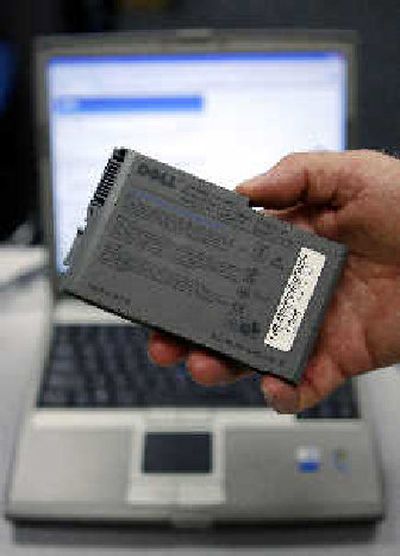Dell customers are taking charge

DALLAS — Dell Inc.’s record-setting recall of 4.1 million notebook computer batteries raised safety concerns about the power source of countless electronic devices, but experts said the problem appears to stem from flaws in the production of the laptop batteries, not the underlying technology.
Customers began calling the company and surfing to a special Web site Tuesday to order replacements for the lithium-ion batteries that could cause their Dell machines to overheat and even catch fire. The batteries were supplied to Dell by Japan’s Sony Corp.
Lithium-ion batteries are not only used to power laptops, but also digital cameras, music players, cell phones and other gadgets.
Dell, the world’s largest PC maker, announced the recall Monday night with the Consumer Products Safety Commission. It was the largest electronics-related recall involving the federal agency.
The batteries were shipped in notebooks sold between April 1, 2004, and July 18 of this year. They were included in some models of Round Rock, Texas-based Dell’s Latitude, Inspiron, XPS and Precision mobile workstation notebooks.
Replacement orders would be filled on a first-come, first-served basis, said Dell spokesman Ira Williams. He said he couldn’t estimate how long customers would have to wait for new batteries, adding that it could vary by model.
The replacements are coming from Sony and a handful of other battery manufacturers.
Rick Clancy, a Sony spokesman, said the company has “taken steps to address the situation … to Dell’s satisfaction.” He declined to elaborate on what the company has done to fix the problem.
Lithium has been replacing nickel-cadmium and other materials for batteries used in a range of electronic devices since the early 1990s. The smaller, lighter batteries produce more power to drive increasingly demanding gadgets, such as laptops with high-resolution screens.
Battery packs contain cells of rolled up metal strips. During the manufacturing process at a Sony factory in Japan, crimping the rolls left tiny shards of metal loose in the cells, and some of those shards caused batteries to short-circuit and overheat, according to Sony.
Roger Kay, an analyst with Endpoint Technologies Associates, called the situation “a nightmare for Sony” but said the recall wasn’t likely to scare manufacturers away from using lithium-ion batteries.